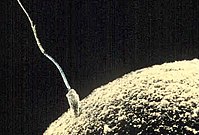
Back نجاح تناسلي Arabic Reprodukční úspěšnost Czech Reprodukta sukceso Esperanto Éxito reproductivo Spanish موفقیت تولیدمثلی Persian Successo riproduttivo Italian 번식 성공 Korean Репродуктивный успех Russian ความสำเร็จในการสืบพันธุ์ Thai Üreme başarısı Turkish

Reproductive success is an individual's production of offspring per breeding event or lifetime.[1] This is not limited by the number of offspring produced by one individual, but also the reproductive success of these offspring themselves.
Reproductive success is different from fitness in that individual success is not necessarily a determinant for adaptive strength of a genotype since the effects of chance and the environment have no influence on those specific genes.[1] Reproductive success turns into a part of fitness when the offspring are actually recruited into the breeding population. If offspring quantity is not correlated with quality this holds up, but if not then reproductive success must be adjusted by traits that predict juvenile survival in order to be measured effectively.[1]
Quality and quantity is about finding the right balance between reproduction and maintenance. The disposable soma theory of aging tells us that a longer lifespan will come at the cost of reproduction and thus longevity is not always correlated with high fecundity.[2][3]
Parental investment is a key factor in reproductive success since taking better care to offspring is what often will give them a fitness advantage later in life.[4] This includes mate choice and sexual selection as an important factor in reproductive success, which is another reason why reproductive success is different from fitness as individual choices and outcomes are more important than genetic differences.[5] As reproductive success is measured over generations, longitudinal studies are the preferred study type as they follow a population or an individual over a longer period of time in order to monitor the progression of the individual(s). These long term studies are preferable since they negate the effects of the variation in a single year or breeding season.
- ^ a b c Moreno, J. (2010-01-01). "Reproductive Success". Encyclopedia of Animal Behavior. pp. 64–69. doi:10.1016/B978-0-08-045337-8.00119-4. ISBN 9780080453378.
- ^ Kirkwood TB (November 1977). "Evolution of ageing". Nature. 270 (5635): 301–4. Bibcode:1977Natur.270..301K. doi:10.1038/270301a0. PMID 593350. S2CID 492012.
- ^ Pierotti R, Clutton-Brock TH (August 1989). "Reproductive Success: Studies of Individual Variation in Contrasting Breeding Systems". The Condor. 91 (3): 750. doi:10.2307/1368138. hdl:1808/18030. JSTOR 1368138.
- ^ Williams TD (2017-10-19). "Parental Care". Physiological Adaptations for Breeding in Birds. Princeton University Press. doi:10.23943/princeton/9780691139821.003.0006. ISBN 9780691139821.
- ^ Fisher RA (October 1915). "The evolution of sexual preference". The Eugenics Review. 7 (3): 184–92. PMC 2987134. PMID 21259607.
© MMXXIII Rich X Search. We shall prevail. All rights reserved. Rich X Search